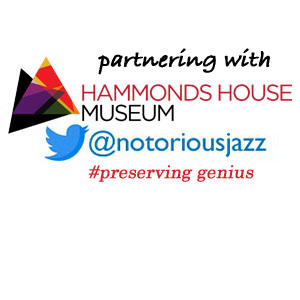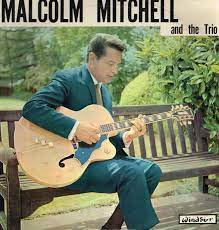
Daily Dose Of Jazz…
Malcolm Mitchell was born in London, England on November 9, 1926 and was originally taught by Ivor Mairants. In 1947 he was teaching jazz guitar when he formed The Trio with pianist Johnny Pearson and bassist Lennie Bush. At the BBC Maida Vale studios the trio would broadcast live on a Saturday morning.
1948 saw Mitchell become the first British musician to play with Duke Ellington and earn money for doing so. In 1933 the Duke of Windsor had insisted on sitting in on drums with the Ellington Band when it visited Britain but he didn’t get paid for it. Mitchell’s debut with Ellington was equally eccentric in its way.
Throughout the 40s and into the 50s the brutish Musicians’ Union, in tandem with the all-powerful fraternity, Ministry of Works, had a rule which banned American musicians from playing in England. In 1948 the Dizzy Gillespie and Spike Jones Orchestras had to cancel projected tours and the only way Ellington was able to work there was as a variety act without his band. He played piano at the London Palladium and music halls in nine other cities with his trumpeter Ray Nance, allowed in as a dancer and thus “Showbiz”, and his singer Kay Davis weren’t banned. The Union presumably didn’t regard them as musicians.
While the Union Ban was in place the Mitchell Trio, now with Johnnie Valmore Pearson on piano and Teddy Broughton on bass, accompanied other bewildered Americans variety artists including Hoagy Carmichael and Maxine Sullivan when they toured England. During those years he toured eight weeks in Sweden with Stephane Grappelli and Django Reinhardt.
His Mitchell Trio, with pianist Johnny Pearson and Teddy Broughton on bass, became well known supporting U.S. jazzmen and singers touring in the UK. Guitarist, bandleader and educator Malcolm MItchell passed away in Bognor Regis, England on March 9, 1998.
More Posts: bandleader,guitar,instrumental,jazz,music
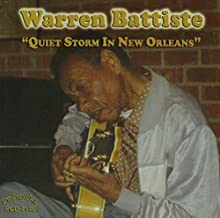
Daily Dose Of Jazz…
Warren Battiste was born on November 8, 1925 in New Orleans, Louisiana and was taught guitar by his father who played the banjo at Preservation Hall. Completing four year of study at Gruenwald Music School in his hometown, he became proficient not only on that instrument but also bass, banjo, and piano.
He first played with Fats Domino before heading off to New York City for Illinois Jacquet’s band. This gave him a very broad understanding from classic blues to R&B and jazz. Back in New Orleans he played thebest clubs on Bourbon Street, from Preservation Hall and Snug Harbor to the Matador and others.
He appeared in the film Shy People with movie stars Jill Clayburgh and Barbara Hershey. Warren has performed with George Benson, Jimmy McGriff, The Platters and The Inkspots. He went on to teach music at Wequachie High School, Essex County College and the Newark Art Center in New Jersey. He has released three albums as a leader ~ Street Jazz, Just Friends and Quiet Storm In New Orleans, the latter recorded in his 80s.
Guitarist Warren Battiste, who has been recognized with a Lifetime Achievement Award In Jazz from the New Orleans Jazz and Heritage Festival, continues to perform.
More Posts: bandleader,bass,guitar,history,instrumental,jazz,music
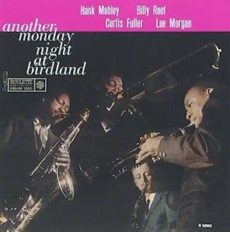
Requisites
Another Monday Night at Birdland ~ Hank Mobley, Billy Root, Curtis Fuller, Lee Morgan | By Eddie Carter
This morning’s choice from the library brings us back to The Jazz Corner of The World for another live set by Lee Morgan on trumpet, Curtis Fuller (tracks: A2, B1, B2) on trombone, Hank Mobley, Billy Root on tenor sax. Another Monday Night at Birdland (Roulette R 52022/SR 52022) is the companion album to Monday Night at Birdland. Rounding out the septet is Ray Bryant on piano, Tommy Bryant on bass, and “Specs” Wright on drums. “Symphony Syd” Torin is the Master of Ceremonies, and my copy used in this report is the 1988 Spanish Mono reissue (Fresh Sound Records FSR-632).
Side One starts with an exhilarating rendition of It’s You Or No One, written in 1948 by Jule Styne and Sammy Cahn. Lee leads the ensemble on the melody before Hank opens the solos energetically. Lee lays down some spirited energy on the second statement, then Billy states his case with a vigorous finale leading to the climax and Syd’s introduction of the next tune. Jamph was written by Curtis Fuller, and I first heard it on the album, Big Six (1958). The septet begins the theme at mid~tempo collectively, then Mobley soars into the lead solo with some energetic blowing. Fuller greets the next statement enthusiastically, followed by Morgan who wails mightily on a vigorous reading. Root keeps the beat on the fourth interpretation with a scene-stealing performance. Bryant takes care of business on the closer with an aggressive solo into the out chorus.
Side Two starts with Syd’s announcement of the next tune, Nutville by Lee Morgan with inspired playing by the septet on the infectious melody. Hank launches into a swinging improvisation that’s a delight. Lee exhibits his skills on a joyful excursion next. Billy comes after him with a stellar statement that made me sit up and take notice. Curtis wraps up the solos with a delightful interpretation that brings so much pleasure ahead of the ensemble’s exit and group introductions. Wee by Denzil Best is an uptempo cooker that flies out of the gate with a high-voltage melody in unison. Mobley steps into the spotlight first with a heated solo. Morgan uses a mute for the second statement and attacks with the speed of a whirlwind. Root displays some lightning-fast chops on the third presentation, and Bryant covers plenty of ground motoring in rapid-fire fashion on the next reading. Wright gets a concise comment during the theme’s reprise into the septet’s lively finale.
Another Monday Night at Birdland was produced by Rudy Taylor and like the first album, the soundstage is excellent for a live recording. This is a four-star blowing session that I’m sure any fan of Hank Mobley, Billy Root, Lee Morgan, and Curtis Fuller would dig. If you’re a fan of Hard-Bop, this album is a terrific addition to any jazz library and one of the best in the Birdland Series!
~ Big Six (Riverside Records RLP12-273), Monday Night at Birdland (Roulette R-52015/SR-52015) – Source: Discogs.com © 2021 by Edward Thomas Carter
More Posts: choice,classic,collectible,collector,history,instrumental,jazz,music,saxophone,trombone
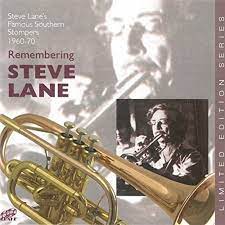
Daily Dose Of Jazz…
Steve Lane was born on November 7, 1921 in London, England where his father was a concertina player who recorded with the Rio Grande Tango Orchestra in the 1920s. Having heard his first jazz in the Rhythm Clubs of the late 1930s, his first choice of instrument was guitar, but, following wartime service, he switched to the cornet on which he soon developed a jazz style based on the hot trumpeters of the 1920s he so much admired, with particular emphasis on his role leading the collective ensemble.
A gifted composer of vocal and instrumental pieces, he deftly incorporated female vocalists as an integral part of the band, thus presenting a range of songs carefully chosen to showcase the singer, and the supporting musicians strictly trained in the art of accompaniment. A taskmaster offering little compensation and weekly rehearsals, his personnel changed often but allowed him the ability to discover young talent such as pianists Martin Litton and Bruce Boardman and trombonist Bob Hunt.
Steve led his own Southern Stompers jazz band in the early 1950, and also led and recorded with his Red Hot Peppers and the VJM Washboard Band for over 50 years. In 1952 he established the Ealing Jazz Club, and in the Sixties establishe the West End Jazz Club and was a founding partner of VJM Records.
Cornetist, guitarist, composer, arranger and bandleader Steve Lane, who was a traditional jazz player, passed awya on August 22, 2015 at age 93.
More Posts: arranger,bandleader,composer,cornet,guitar,history,instrumental,jazz,music,vocal
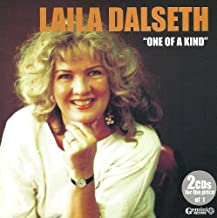
Daily Dose Of Jazz…
Laila Dalseth was born November 6, 1940 in Bergen, Norway. After an early debut in her hometown she became active on the Oslo, Norway jazz scene, recording with Kjell Karlsen, Egil Kapstad and Helge Hurum’s big band. Her first recording was Metropol Jazz in 1963, then she was a part of Stokstad/Jensen Trad Band from 1973 to 1975. This she followed with a stint in a band with Per Borthen, then at Teatret Vårt in the play Havhesten in 1976.
>With her own band, Laila recorded Listen Here! (1999), 1960’s album One of a Kind (2000) and then Everything I Love (2003), all on the Gemini label. Her L. D. Quintet consisted of her husband Totti Bergh on saxophone, pianist Per Husby, bassist Kåre Garnes and Tom Olstad on drums.
Dalseth was awarded Buddyprisen in 1976, the Spellemannprisen i klassen jazz on three occasions, for Just Friends in 1975, Glad There is You in 1978 and in 1984 for Daydreams. International recognition came in the Eighties with her release of for the record Time for Love with Red Mitchell, Travelling Light with Al Cohn, and into the 1990s with The Judge and I with Milt Hinton, A Woman’s Intuition, her own sextet featuring guitarist Philip Catherine, and into the new century with We Remember You with Al Cohn, and Everything I Love.
At 80, vocalist Laila Dalseth has recorded thirteen albums, received eight awards and remains active on the jazz scene.
More Posts: bandleader,history,instrumental,jazz,music,vocal


